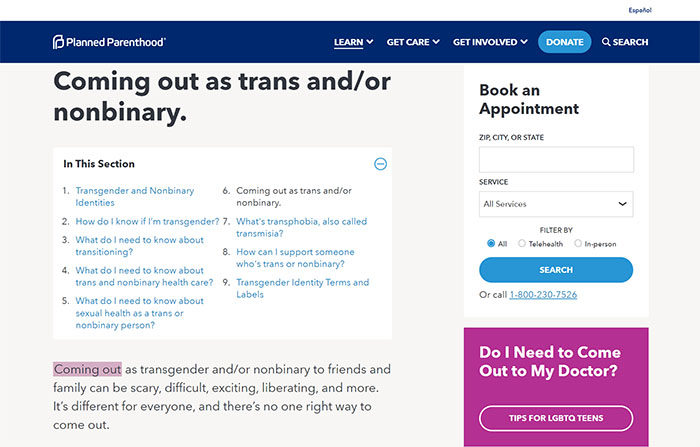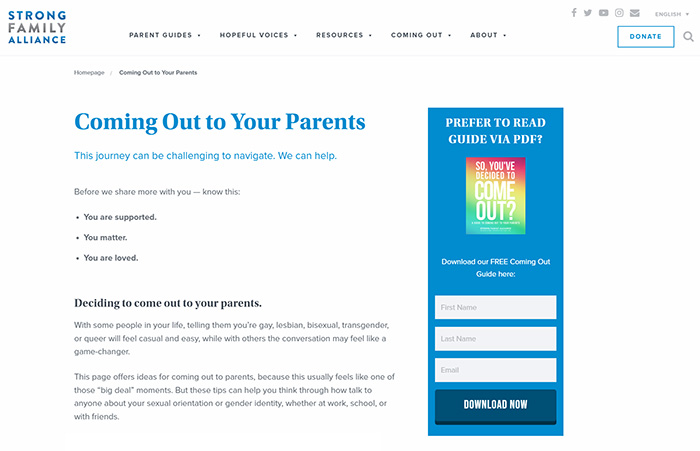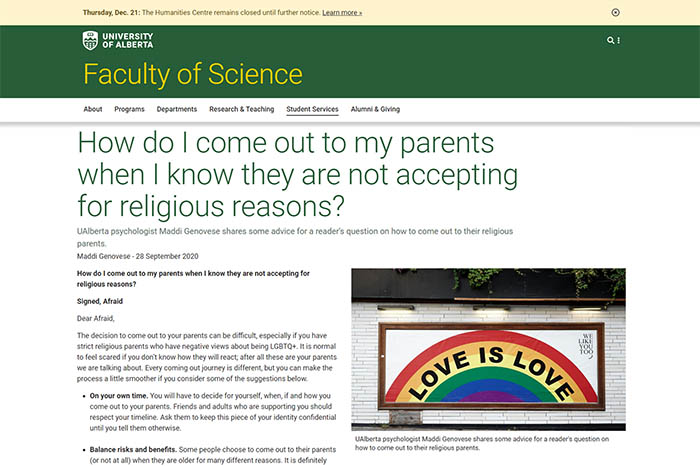FTM: How to Come Out to Your Parents
The most challenging part of being an FTM is expressing yourself to the world. For example, come out to your parents that you are transgender; hence, it might be difficult, stressful, and even life-threatening.
You may fear their reactions and how they may treat you afterward.
Therefore, this is a severe task that you must plan well for favorable outcomes.
This guide will take you through the crucial steps and techniques to ensure this dialogue goes as effortlessly as possible.
Balancing Risk and Reward
Coming out begins by examining whether you want or need a change of environment and if you will manage in your chosen domain.
Do you have all the financial freedom to support yourself fully?
Be aware that you might experience some emotions–both positive and negative plus financial aspects, which result from telling people that you are an FTM individual.
Think about your support system composed mainly of parents and whether you will be okay if they could withdraw at any given point financial and emotional support after you come out to them.

Test the Waters
It might help to gauge the water before you dive into talking about your transgender identity.
Have family discussions on issues such as homosexuality while relaxing with your friends and relatives.
To see how your parents will accept or resist, observe how they react or respond while you narrate such stories.
The initial stage may give you an idea of what they think about your proposal, and such information may also offer hints on how you can proceed with your work of coming out to them.

Make a Plan
Coming out is a major life-changing event that often causes anxiety to you and the people you are coming out and expressing yourself to; however, careful planning can help reduce this anxiety.
Develop a systematic manual involving the anticipated response of your parents, your psychological state, and available support mechanisms.
For instance, if your parents get disappointed and curse you out, who can you turn to give you the support you need?
The process of coming out to your parents as an FTM individual can be easy if you develop a plan for how you will respond to their reaction.

a) Anticipate Your Parents’ Acceptance
It would help to have a positive outlook as you prepare for all the possibilities since it will also help you calm down and reduce anxiety.
However, although optimism is helpful, you must stay realistic to avoid being shocked by their reactions.
Just appreciate the fact that it’s uncompromising news for your parents, especially if they have no idea of your gender identity and they assume the one you were born with; therefore, they might have to make the necessary adjustments as they absorb the information.

b) Choose the Right Way, Time, And Place
It would help if you remembered that you and your parents need to be at the right place and time to deliver the information to them appropriately.
Please select a time when your parents will not be too busy to listen carefully to what you have to say and a place where they are more comfortable to avoid causing a scene.
Ensure the atmosphere is conducive by choosing a site that will give room for frank dialogue privately.
The rightly chosen environment has a significant influence on the final result of the conversation.

c) Find Books or Websites About the LGBT Community and Offer to Your Parents
One way to create awareness about the FTM community is through books and websites.
A better case would be to offer educational materials to your parents, who would take more interest and could help you understand.
This may happen after you have shared your gender identity with them and as a way of providing you with the support you need since it’s new to them.
Share books with them or recommend some reliable websites on FTM, among other aspects of the life of LGBTQ, which will assist in clearing doubts and give a basis for meaningful debate.

d) Prepare in Advance for Questions They May Ask
Be ready to answer parents’ questions and provide well-grounded and sincere replies.
You should avoid being rude and dramatic to them, especially when they ask tough questions, as this will only worsen the case.
Also, preparing your communication in advance will boost your confidence during the interaction and show interest in an open discussion.

e) Consider Coming out to One Parent First
You may realize that sometimes it’s easier to discuss an issue with one of your parents since you feel more comfortable with them than the other parent.
To avoid being too overwhelmed, try contacting only one parent first, who you think you trust and who listens to you without judging you.
However, this approach enables you to measure the first response and find an ally for your side in the family structure who will stand by you despite others cursing you out.

Organize What to Say to Your Parents
Organize your thoughts in a script if that’s required for you to express yourself better since anxiety may make you forget the right words and expressions to use.
Make apparent feelings, experience, and the rationale for making you decide to come out.
This process is essential since you may have a parent who is strict and wants more explanations as to why you choose to come out.
A structured message will guide the discussion and enable you to complete the entire topic.
a) How to Start the Conversation
However, initiating this discussion takes a lot of courage and the utmost sensitivity, as you may need to know the reaction you will receive from them.

b) Come out to Your Parents About Your Sexual Orientation
Since your parents gave birth to you, they may assume your sexual orientation to be your gender identity, which is the one you were born with at birth.
As a transgender person, you should come out to acknowledge that coming out means describing your sexual orientation, different from your gender identity.
Therefore, you should identify the differences to eliminate confusion and improve understanding while contacting your parents.

c) Explain It Clearly so Your Parents Understand
While coming out, use simple language to talk about your transgender identity and to avoid confusion.
You can also ensure they understand what you mean when coming out as an FTM by providing them with online resources that will let them know.
Try to make your parents appreciate the gravity of your feelings, authentic character, and identity as much as possible.

d) Explain Why You Didn’t Come out Before
Answer questions concerning why you choose to emerge late so they may understand how to deal with the issue.
Explain to them how you managed to withhold crucial information regarding your sexuality, such as internal conflict, societal strain, and fear of being rejected, as this will enable them to know what kind of support they may offer.

Come out to your parents
You will also need to follow the guide below while coming out to your parents:
a) Follow the Plan That Has Been Developed
Follow your plan but stay flexible in moving with the conversation, but do not fail to address the critical issues.
While having a plan provides some direction, it is essential to let the discussion develop independently.
b) Be Sensitive to Your Parent’s Feelings and Reactions
Understand that your parents are likely to feel shocked, confused, and, sometimes, in denial.
Show empathy and give them time to understand the information you share.
Do not get defensive; provide consolation and compassion to enable you to process the way forward.

c) Stay Calm During the Conversation
Please do not get discouraged when your parents ask hard questions; listen patiently to their views and reactions.
Your coolness will guide and set a positive tone for the discussion that can make your parents more relaxed.

d) If You Are Nervous, Find Ways to Relax Yourself
Before engaging in such a conversation, you must feel relaxed and confident.
For instance, you may take a walk, listen to your favorite playlist, and take a deep breath to help you relax.

What Should I Do After Coming Out?
Remember that your parents may require time to digest the details after the first conversation.
Here are a few things you will do after coming out;
a) Parents Need Time to Accept, So Be Patient
This is a slow procedure called acceptance, which can take your parents weeks, months, or even more for them to understand and accept that you are an FTM.
Be patient with them as they go through different emotions and understand the facts.
b) Accept Your Parent’s Emotions
Your parents may experience a variety of feelings, including bewilderment, anxiety, and even depression.
Assure them that their feelings are validated and acknowledge that this is also a significant switch-over for them.
Always keep communicating and provide support until they are ready and willing to accept you for who you are.

c) Find a Supportive Relative to Comfort Them
Sometimes, it may turn out too heavy for them to find a supportive relative to console their parents for those few months of transitioning.
Talking to someone who likes and trusts you can help you and your parents.

d) No Matter What the Outcome Is, Put Your Mind at Ease
Remember that it takes bravery to live authentically and be true to yourself since most people always hide behind the closet.
If there is an initial adverse reaction, the world could change; one day, your parents may realize, understand, and accept you for who you are.

Conclusion

You should note that the decision to come out to your parents as an FTM is a crucial step that needs you to conduct a complete preparation.
Striking the right balance between risk and reward and having a structured plan are among the things that will help you move forward confidently through this discussion.
When breaking the news to your parents, remember to do so with patience, empathy, and an open heart; and seek support from friends, relatives, or resources in the wider queer society.
Finally, the journey to acceptance never ends, and you must keep communicating to have understanding and belonging in your family.

 Basic Packers
Basic Packers Pack & Play
Pack & Play STP
STP